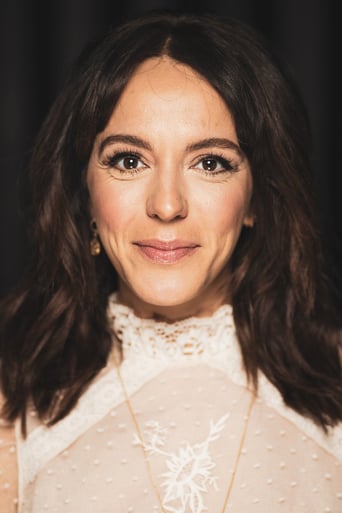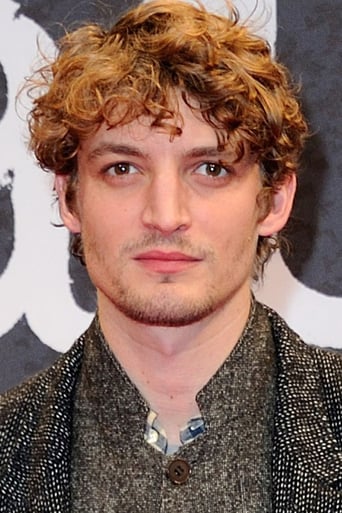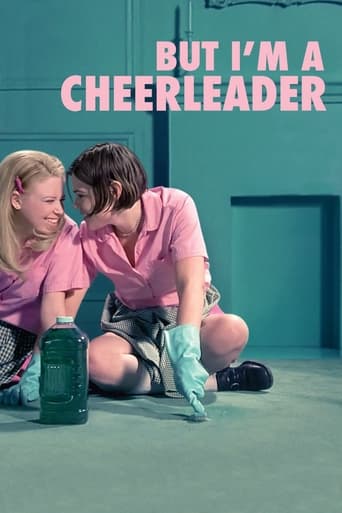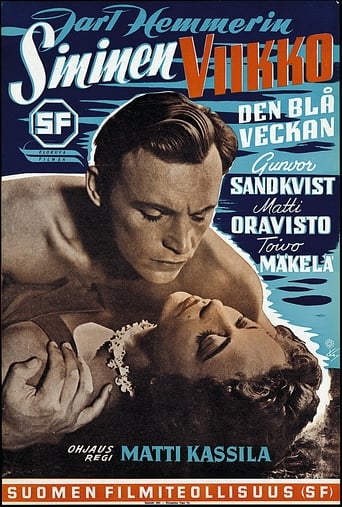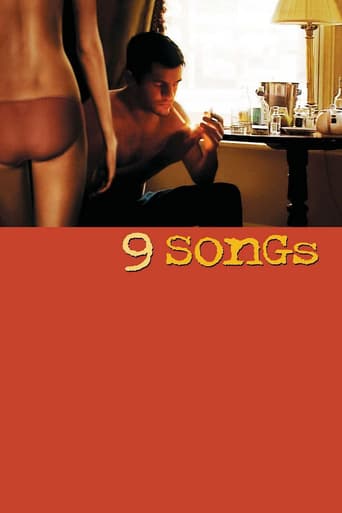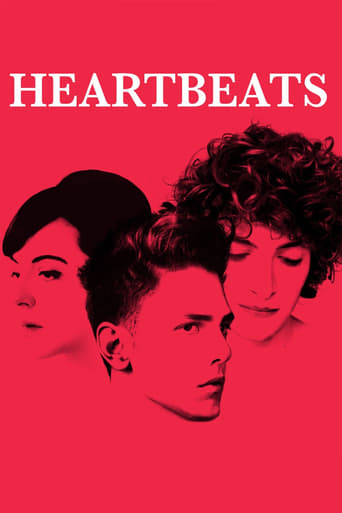
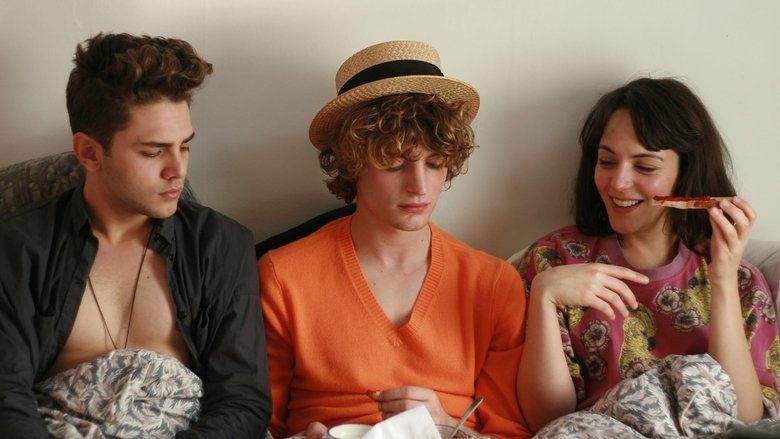
Heartbeats (2011)
Francis is a young gay man, Marie is a young straight woman and the two of them are best friends -- until the day the gorgeous Nicolas walks into a Montreal coffee shop. The two friends, instantly and equally infatuated, compete for Nicolas' indeterminate affections, a conflict that climaxes when the trio visit the vacation home of Nicolas' mother. The frothy comedy unfolds through narrative, fantasy sequences and confessional monologues.
Watch Trailer
Cast
Similar titles
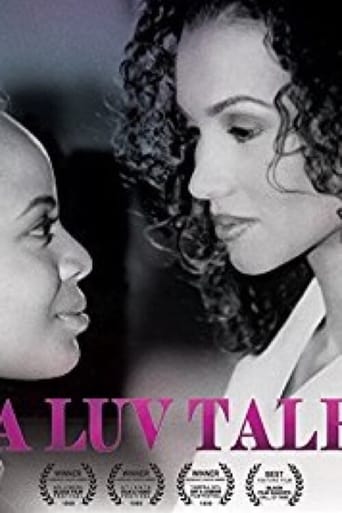
Reviews
Touches You
Tells a fascinating and unsettling true story, and does so well, without pretending to have all the answers.
The story, direction, characters, and writing/dialogue is akin to taking a tranquilizer shot to the neck, but everything else was so well done.
Each character in this movie — down to the smallest one — is an individual rather than a type, prone to spontaneous changes of mood and sometimes amusing outbursts of pettiness or ill humor.
Too often, crucial nuance is lost in translation for English-speaking audiences, and 21-year old French-Canadian Xavier Dolan's second film as writer/director/star/costume designer (all right, we get it ) is a perfect example. While its English title, Heartbeats, is appropriately poetic and fluttery, its original French title, Les Amours Imaginaires, ("The Imaginary Loves"), is so on-point it verges on a spoiler warning. But what isn't lost in translation is Dolan's keen, immaculate talent, and his rare foray into comparative levity - "romantic comedy" by way of cattiness and heartbreak - may be frothier than his average fare, but it's infectiously watchable, and wickedly amusing. Dolan is clearly enamoured with early François Truffaut: his debut, I Killed My Mother, is a direct shout out to The 400 Blows, while Heartbeats is unapologetically a functional remake of Jules & Jim's steadily imploding friendship-turned-love-triangle. There's a deliberateness to this comparison, however, as Dolan employs this juxtaposition between the Bohemian-chic of WWI- era France and 21st century Montreal hipster culture to tease out the timelessness of love, lust, and folly in ambiguously intimate friendships. The ensuing proceedings are as delightfully droll as you'd expect, as Dolan deftly dances back and forth between his two lust-struck protagonists, forcing viewers to continuously reconsider their sympathies and allegiances as each sequence is filtered through their alternating points of view. The film feels almost tangibly laden with sexual tension, but Dolan continually, increasingly challenges us: is this the case, or is it a case of our protagonists (or we, the viewers) misguidedly supplying it? Thankfully, Dolan proceeds through this murder mystery of flirtation with a teasing playfulness. His outlandishly hip stylistics - scenes lit in bold, single-colour pastel lighting; snarky, Wong-Kar Wai style slow-mo walking sequences coupled with a cover of Nancy Sinatra's "Bang Bang, My Baby Shot Me Down" as leitmotif (though a cameo of House of Pain's "Jump Around" is more fun); at one point a character is even showered in slow-motion falling marshmallows - set the tone perfectly: suave, artsy, and only retroactively coded as self-reflexively tongue-in-cheek. For those who didn't wear their $455 tangerine cashmere sweaters to the screening, the film may skirt the line of becoming too insufferably hipster to bear (a poem penned on a typewriter mailed in a black envelope with a wax seal? Please ) if satire - occasionally excruciatingly awkwardly so - isn't your strong suit. It isn't helped by a second act lag, as the initial smiles prompted by the characters' brewing hysterics fade somewhat. But have patience: confident as they may seem, the proceedings and characters are meant to play as human, but still ridiculous, and we're given sneaky reminders along the way to tide us by. Finally, just when we feel like our sympathies, such as they are, have finally settled by the film's climax, Dolan, with another neat, hilarious reversal, turns the tables, and ties it all together with a Forever 21 bow, complete with a sublime 'anti-moral' that brings cringes and laughs in equal measures. Dolan's mediation of himself as star is droll in itself – amusingly, he initially makes no pretence at unbiased treatment of which 'team' viewers are invited to cheer for, though ripples invite sympathy or scorn for all parties involved through. Regardless, Dolan's acting proves just as committed as his directorial work – passionately emotive, with a bold anti-charisma alternatively sweet and pathetic, and replete with the subtlest tics to convey volumes of awkwardness or loneliness. Monia Chokri is somewhat less accessible, but still gives a boldly cold, clipped performance, her reserve and stylishly antiquated wardrobe serving as protective armour, fiercely conveying her longing in a deeply rooted, if not always wholly sympathetic, fashion. Finally, as the object of their affections, Niels Schneider pitches his cheeky, ambiguously alluring charm exactly right, and managing to convey a surprising amount of paradoxical sentiments with one cryptic phrase: "Love me or leave me." To ride out a metaphor Dolan would doubtlessly detest, Heartbeats is a macaron of a movie: colourful, sweet, chic, and deceptively dense, but a fleeting, albeit delicious, trifle. It's lots of fun, immaculately constructed, and containing plenty of hearty character beats, but its deliberately shallow plot doesn't keep up with its stylizations enough for it to linger as much as some of Dolan's meatier, more serious work. Still, 'fun' is a crucially rare word in most critically regarded Canadian cinema, so, for this alone, Heartbeats is a worthwhile and highly enjoyable outing by one of the most promising contemporary voices in the industry. If this is Dolan's indictment on contemporary youth culture, I'd be terrified to see his take on senior citizenhood, a-la Amour -8/10
Superb. Xavier Dolan, "infant prodige" of Canadian cinema, follows his semi- autobiographical "I Killed My Mother" with a probably similarly autobiographical opus, also in quebecois, about falling in love. It turns on a menage a trois with a twist which sets it apart from "Jules et Jim" etc.: a man and a woman are enamored of the same man. It is an otherwise familiar tale of unrequited love, but told and shot with tons of metrosexual (in Simpson's original sense) style and sophistication.Old friends Francis and Marie find themselves in pursuit of the same decidedly un-obscure object of desire in the person of Nicolas, an Adonis who proceeds to tease the two and play them off against each other at his leisure, until they ultimately clash. In the meantime, the two take other lovers to work off the sexual frustration that inevitably comes from the fruitless chase after Nicolas. These night moves are deftly filmed in slow-motion and unearthly light that makes it look as if they took place on another planet - a metaphor for where the two might just as well have been as far as their minds and hearts were concerned at the time. The degree of their love-jones over Nicolas can be gauged by the snaps of Michelangelo's David that float on the screen in montage as they raptly gaze at him gyrating at a party. Interspersed in the narrative are soliloquies by assorted young adults apparently out of any character, simply talking about their own heart-pangs and amorous angst. Lacking any direct bearing on the plot, they turn up and rattle on like the personae in the video works of contemporary artist Ryan Trecartin, whose primary-color interiors have something in common with those of Dolan, come to think of it.Blonde-headed Nicolas bears a strong resemblance to Tadzio, but unlike in "Death in Venice," there comes a moment of truth for both of the smitten, who cast away their formidable pride and bare their hearts, only to have them brusquely, almost cruelly, broken, one after the other. The end. Or so I thought.But there is a brief yet delicious denouement, in which we learn that, happily, neither Francis nor Marie has the self-destructive inclinations of von Aschenbach or the never-stop tenacity of Frank Raftis in "Falling in Love." They get over the hurt, repair their friendship after the damage done by the quarrel over Nicolas, and before long are again popping up together on the party scene, surveying the crowd for new prospects. In the wry final frame, they simultaneously sight and step towards a new prey, from whose perspective they must look quite like the vampiric couple Adam and Eve as they pounce in the very last shot in "Only Lovers Left Alive."Some reviewers reflexively mention names like Truffaut and Godard when gushing about Dolan, but his loquacious, mensch-centric approach calls more to mind another actor-cum-director - right, "Les Amours" could better be likened to a way-cool, 2010-upgrade "Manhattan." - J. Koetting
Having a threesome often means dealing with very difficult personal issues. If you don't succeed, then this strange relationship is doomed to fail. When Francis and Marie meet Nicolas, a young, blonde, rich and highly intelligent boy, their lives change. Although at first they try to deny it, they fall deeply in love with Nicolas.Nothing can guarantee a healthy relationship, but here the protagonists embark upon an almost impossible journey. Nicolas acts like an unprejudiced and very liberal young man who doesn't care about Francis' homosexuality or Marie's uptightness. As they become friends, Nicolas transforms himself into the object of desire of both Francis and Marie.Nonetheless, nothing seems to indicate that Nicolas has feelings towards Francis, after all they have only shared a handful of meaningless –although rather intimate- moments: Nicolas had been roughhousing with Francis in the woods, and also, after sleeping together, Francis had noticed Nicolas' leg rubbing against his own. These are just minuscule details but Francis starts to get obsessed about his young friend. At the same time, Marie convinces herself that Nicolas is the love of her life; she is now worried about Francis advances, and because of that their friendship might come to an end.Nicolas is very handsome and exudes a sex appeal unlike any other youngster, and it's because of that that he turns into a symbolic phallus, ascribing to the genitality that condenses the nature of the object of desire. To explain this situation better, let's remember that Marie keeps dating other men but she finds these dates dull and completely forgettable. Francis does the same, but as he has casual sex with other guys, he realizes that none of them can be compared to Nicolas. Erotic objects, for man, are frequently aberrant, multiple and interchangeable. This is why Francis can still have sexual intercourse with multiple partners, who have no real defining features, they are, after all, interchangeable and, ultimately, aberrant. Under these circumstances, Francis' pain and suffering can only be subsidized by the tacit competition he maintains with his friend Marie. Jacques Lacan said once that no object of need and/or demand will ever satisfy the desire/subject. This is why Nicolas inserts himself in the realm of the phantasm; id est, he's an idealized figure that can never defy reality nor exist in the real.The more time Francis and Marie spend with Nicolas, the more elusive and ungraspable he becomes. As they get closer to him, a barrier, a distance, is made evident. When the objects of need are metabolized ('eroticized') into signifiers of desire by virtue of the demand, it's rather obvious that any object will do as "object" of desire, since none will do. When Francis is alone in Nicolas's bedroom and starts smelling his pants and shirts, he cannot stop masturbating, evoking not the real boy but his traits, his invisible presence that has no place in the realm of the real. Nicolas, after all, is the object a, the object of desire, and since he is the target of men and women's libido he's also, in general terms, a nonexistent character.This doesn't mean, however, that Nicolas' presence or absence doesn't have a profound effect in the lives of Francis and Marie. Director Xavier Dolan creates a fascinating group of characters and a really complex, intense and innovative story. Xavier Dolan is not only a magnificent writer and filmmaker, he's also a wonderful actor (he plays Francis, although he also had a part in another gay-themed production: Miroirs d'été, which I reviewed a few months ago). Niels Schneider gives an astounding performance as Nicolas, and so does Monia Chokri. Not only is the acting great, but the cinematography in general and the soundtrack of this film are truly unforgettable. In the end, as Lacan explains to us, the object of desire is bound to impossibility and that's what the protagonists learn the hard way. Poignant, sad and powerful, Dolan's film is a masterwork.
What an awful film! The worst I have seen in many moons. It's not worth writing any details about this trash. Xavier Dolan fancies himself as a filmmaker? Ha, ha! The guy bites his fingernails! Did anyone else notice that in the close-ups? The story itself was not bad and could have been told in a much more interesting way. The testimonies about relationships we hear from people who have nothing to do with the main characters, are tossed at us in between scenes and only distract and do not enhance the film. Les amours imaginaires? I imagine Dolan doesn't know much about l'amour...
